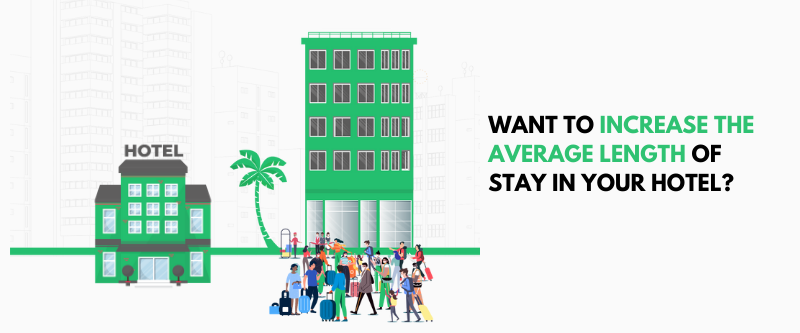No doubt, guest experience matters the most when you run a hotel. But that doesn’t mean you can overlook your hotel’s bottom line.
Is there a middle ground? Of course, yes! Several strategies help in delivering a great experience and bagging good profit. But the one I am addressing here is increasing the average length of stay in a hotel.
Table of Content
- What is Length of Stay (LOS)?
- Why is Length of Stay important?
- How Hotels Can Increase the Average Length of Stay?
- Find out who’s your specific audience
- Create a smart pricing structure
- Set minimum bookable nights restriction
- Create attractive packages
- Bet on corporate events
- Include exciting activities
- Pitch offers/discounts to guests staying at the property
- If there’s an exciting event happening, send an invitation/free pass
- Suggest reasonable flight tickets
What is Length of Stay (LOS)?
Length of stay (LOS) in hotels is the number of nights a guest stays.
LOS = date of departure - date of arrival
Now, LOS isn’t just an aspect; it helps hoteliers in making informed decisions. For that, the average length of stay in a hotel is what needs to be determined.
What is the Average Length of Stay (ALOS) in a Hotel?
The average length of stay in a hotel refers to the average amount of days guests stay at the hotel during a particular period.
But, do you know how to calculate the average length of stay in hotels?
Here’s the formula to calculate the average length of stay in a hotel:
ALOS = No. of occupied room nights (Total length of stay)/ Total Number of bookings
Let me explain with an example.
Hotel Minnesota had 4 bookings last month. Each of the guests spent 5, 2, 12, and 11 nights respectively. Therefore, the ALOS will be as follows:
Total length of stay = 5+2+12+11 = 30
Total bookings = 4
ALOS = 30/4 = 7.5
Why is Length of Stay important?
Length of stay, or to be extra-precise, extended length of stay is crucial for hotels. It’s always right as rain when hotels successfully manage to land bookings for guests with lengthy stays.
Let’s look at some of the advantages of the length of stay for hotels:
- Hoteliers don’t have to worry about getting their rooms booked for a certain period.
- They get the opportunity to earn more revenue that lasts for a longer period.
- They can sell additional services to the guests staying for long.
- LOS enables hotels to target certain groups/segments of travellers in a much better way.
Moreover, LOS is not just beneficial for hotels, but also for guests in many ways.
- Guests get a longer stay at a reasonable price.
- They get to avail much more amenities compared to traditional stays.
- They might also get free services (only if the hotel offers) for extending their stay.
Length of stay, if strategized properly, can be a win-win for both guests and hotels. And this is exactly what I am going to help you with.
How Hotels Can Increase the Average Length of Stay?
To increase the average length of stay in a hotel, you need to up the LOS. When you look at this scenario carefully, there are three aspects of increasing the length of stay.
- Analysis always comes first because your strategy should not be a shot in the dark.
- You can sell lengthy stays during the time of booking.
- You can make your in-house guests extend their stay.
So, the points I am mentioning here are based on these three aspects.
1. Find out who’s your specific audience
I cannot emphasise enough how prominent it is to determine your target guest segment.
Even though various types of guests visit your property, there’s always one or two prime guests segment visiting your property.
So first, learn the ropes and then move on to building your LOS strategy.
The best way to go about it is by tapping into the pile of data you have. Look into the data and every tiny detail.
For example: Try to determine at what time of the year you have had guests that stay longer. Were they individuals or groups? If they were groups, were they friends and family or some corporate folks?
That’s not all. You can explore more. Find out whether it was already a long stay booking or they extended their stay. If it’s the latter one, what services did they avail?
It all boils down to the way you narrow down. The more insights you gather, the better you can analyse.
#ProTip: Have a best-in-class property management system deployed that lets you integrate a channel manager, booking engine and more. This will help you, big time.
2. Create a smart pricing structure
Money matters!! People don’t want to pay for hotels that are overpriced even for a night’s stay.
Meaning, if you want your guests to stay with you for a longer duration, you need to set smart pricing. Simply put, it has to bring you profit, and at the same time, should go lighter on your guests’ wallets.
Working with revenue management experts ensures you the same. Therefore, I suggest hiring top-class revenue managers.
These sets of people have immense knowledge of the industry and know all the strategies that work.
3. Set minimum bookable nights restriction
The minimum bookable night is a restriction that doesn’t allow guests to make a reservation for less than a certain number of nights.
For example, if the hotel has set a minimum bookable night restriction for three nights, the guests cannot make a reservation for less than that.
This strategy is considered to be one of the most effective yet overlooked strategies to increase occupancy and revenue. This restriction ensures that your hotel gets the bookings it wants.
However, there are times, for various reasons, hotels don’t want guests to stay for a much longer time.
What to do in that scenario? Maximum bookable night is the answer. It is a restriction that makes sure your guests can’t book more days than you want.
4. Create attractive packages
You have to give your guests a reason to book with you for a longer duration. And you can do that by creating attractive packages.
However, I recommend taking a smart approach to creating packages.
You can create three different types of packages.
- Pre-defined Package: These packages come with predefined services and prices. Anyone can avail this package and there are no options to make any changes.
- Custom Package: This allows people to customise their package. They can choose activities, amenities, number of nights, etc.
- Personalised Package: These packages are specially created for certain guests based on their historical data.
The better you create the package, the more are your chances of landing extended stay guests.
5. Bet on corporate events
Corporates are a great source of increasing occupancy. Furthermore, they contribute to a hotel’s revenue in other ways as well such as events.
For example: NextBig Tech is going to host a 3-day event at your hotel’s banquet hall. It is a great opportunity for you to sell out several rooms for a certain period. On top of that, the company has decided to book 2 extra rooms a day before the event for some employees to make the arrangements for the event.
Another example: There are times when companies have employees in remote locations. Every month they call those employees to the office for a week. If your hotel is in agreement with that company, you can sell your rooms for those remote employees to stay.
Many hotels do not work enough to partner with corporates, which is not a good practice. If your hotel is capable or has all the required services, you should try to partner with such companies. They indeed contribute to a great extent.
6. Include exciting activities
Why would a guest stay at your property for an extended period if you don’t have anything else to offer other than the room?
Like I mentioned above, you have to give them a reason to stay.
For example: A family from the neighbouring city has booked your hotel for three days. But on the second day, they come to know that your hotel also offers trekking and camping and decide to extend their stay for one more day.
Now, what most hotels would do is just accept their request and charge them for the service. However, if you want to retain that guest and leave a good impression, you can take this opportunity and offer a minimal discount or maybe a free meal.
You have to play your cards right and look at the long term goal as well.
7. Pitch offers/discounts to guests staying at the property
In the previous point, you have offered a discount when the guest decides to extend the stay. But here, you have to be a little advanced.
Don’t wait for your guests to discover your hidden services (s/he might not be in the mood for a treasure hunt). Rather, drop him/her a text or an email with some discount.
For example: A day before their check-out, you can drop a text stating that you are giving a free meal and a 20% discount on trekking and camping. Or something like “extend your stay by one more night and get free lunch and dinner for three”.
8. If there’s an exciting event happening, send an invitation/free pass
If I was a hotelier, I would do this without a second thought.
What happens mostly is hotels also get a certain number of free passes for the events happening at their property. Now, it depends on the hotel how they are going to use it. They can give it to their employees or they can use it some other way.
Now, if I was a hotelier, I would keep some passes with me so that I could offer them to my guests.
If there’s a concert happening tomorrow at the property, I would look into my records and figure out which guest is more likely to stay and attend the event. And then I would reach out to him/her and offer them the pass. S/he just has to pay for the stay and attend the concert for free.
9. Suggest reasonable flight tickets
To help you understand better, I have to use an example.
For instance, Mr Henry has checked into your hotel today and is going to check-out after two days. Now, if you happen to know where he’s going to fly after checking out, you can look for cheaper flights.
Now, you must wonder what if his flight is already booked and at a reasonable price. Well, that’s a bitter possibility. But is there anything you have loose in taking a wild guess? It’s like the ‘moon shot’.
Further, Mr Henry happens to interact with you, ensure that the conversation is engaging and if you find the opportunity, pitch in the idea that you can book his flight; that too at a reasonable rate.
If he says yes, you get an extended stay!!
In this scenario, everything comes down to your communication skills.
Conclusion
Running a hotel is a tough job. There are a bazillion strategies to keep in mind. Sometimes one strategy works and sometimes one doesn’t.
The best you can do is to keep analysing and testing whatever you deploy. And it is the same with extended stays.
However, it is a little trickier. You have to be smart as a whip or work with people who have experience.
The tips I have mentioned are going to work, no doubt; but if you couple them with best-in-class revenue management system, then you’re sure to drive excellent results.



